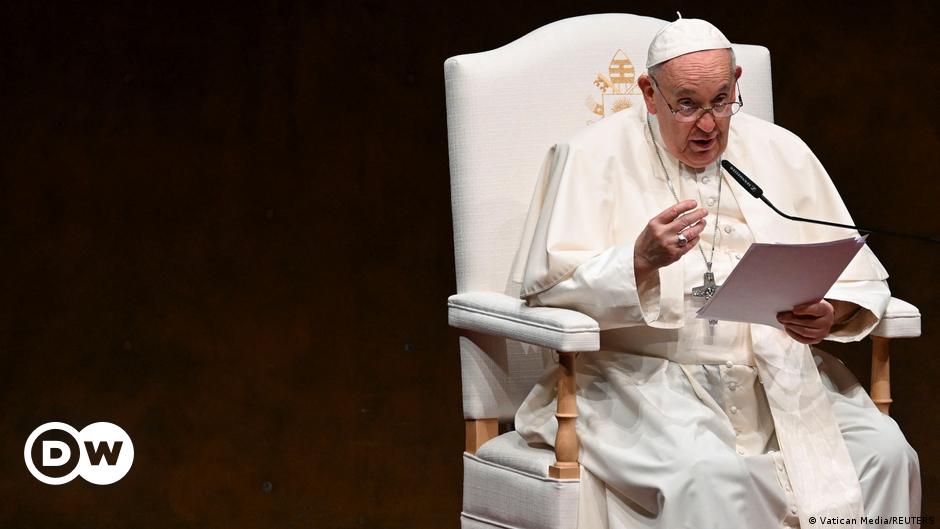Pope Francis has lamented a “very strong reactionary attitude” in the US Catholic Church, saying that ideology had replaced faith in some parts of it and some members had failed to understand “there is an appropriate evolution in understanding matters of faith and morals.”
During his decade as pontiff, Francis has often faced criticism from conservative sectors of the US church, opposed to reforms such as giving women and lay Catholics more roles and making the church more welcoming and less judgmental towards some, including LGBT people.
The comments were made in Portugal on August 5, during a private meeting on Francis’ trip to Lisbon with members of the Jesuit order the pope belongs to, but were scheduled to be published in full as part of the Italian Jesuit journal Civilta Cattolica’s end-of-August edition. Daily paper La Repubblica published excerpts in advance on Monday
During the question-and-answer session, a Portuguese Jesuit said that he was saddened while on a sabbatical in the US to find many Catholics, including some bishops, who were hostile to Francis’ leadership.
“You have seen that in the United States the situation is not easy: there is a very strong reactionary attitude,” Francis said. “It is organized and shapes the way people belong, even emotionally.”
The liberal Argentine pontiff, born Jorge Mario Bergoglio, has also faced criticism from religious leaders and conservative media in the US on a host of his other stances, including climate change, immigration, social justice, gun control and opposing the death penalty as “neither human nor Christian.”
“You have been to the United States and you say you have felt a climate of closure. Yes, this climate can be experienced in some situations,” Francis told the questioner. “And there, one can lose the true tradition and turn to ideologies for support. In other words, ideology replaces faith, membership in a sector of the church replaces membership in the church.”
Francis said his critics needed to understand that “there is an appropriate evolution in the understanding of matters of faith and morals,” and that being backward-looking was “useless” for the church.
He said it was an “error” to consider church teachings to be a “monolith.”
Francis gave both a historical and a more recent example to try to illustrate this, saying there was a time when many in the Catholic Church would have supported slavery. In the more recent case of homosexuality, he said, “it is apparent that perception of this issue has changed in the course of history.”
“But what I really dislike more generally is when you look at the so-called sins of the flesh through a magnifying glass, as people did for so long,” Francis said. He argued that pastoral care required “sensitivity and creativity,” also mentioning his first meeting with trans people. “It’s become clear to me that they feel spurned. And that’s really hard,” he said.
One of the pope’s fiercest American critics is Rome-based Cardinal Raymond Burke. He wrote in an introduction for a recent book that a meeting of bishops called by Francis for this October to try to help chart the future of the church risked sowing “confusion and error and division.”



I wasn’t using perceived there to suggest that the USSR didn’t oppress religion, but rather to point out that it was a reaction to beliefs in America at the time. Whether the reality of USSR was different from that belief wouldn’t have mattered as the decision to emphasize religion in the US was a direct product of the US anti-communism propaganda effort (once again, because I know there’s a significant tankie population on Lemmy, I’m not advocating FOR communism here). It’s sort of like a second order effect. First you have the reality of life in the USSR. Then you have how the US populace perceived that life. Lastly you had the political decisions designed to steer that perception towards their own ends. Encouraging deeper religiousness in the US or even the perception of such was simply seen as a wedge issue that could be used both domestically and abroad to try to steer people towards the US side of the cold war.
For sure, sorry you seemed reasonable enough that I figured you meant it more as “regardless of the reality this is what the US thought and used it as a point to make legislation based off of” but with how many USSR apologist tankies there are I wanted to make sure everyone is clear that there was a massive push from the established powers in the Soviet Union to wipe out religion. They even had a five year plan (as if) to try to accomplish this goal.
It’s also worth pointing out that this was all taking place at the height of McCarthyism. There’s a lot you could get away with in the US at the time simply by framing it as anti-communist and adding “In God We Trust” to the currency was just one such example. Something else interesting that I ran across while doing some fact checking here was this flier from 1955 that seems scarily similar to current propaganda. Just goes to show I guess that the more things change the more they stay the same.
Don’t forget adding it to the pledge, that happened around the same time because Eisenhower was onboard with McCarthyism.